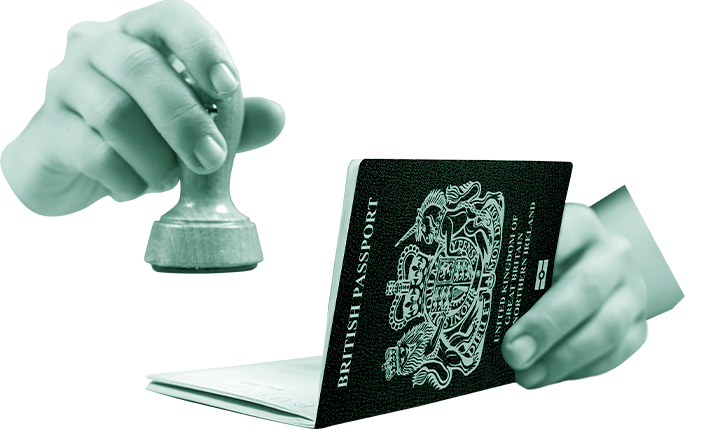Visa applicants are not required to meet strict requirements other than to show that they have successfully completed a course of study at UK bachelor’s degree level or above with a Home Office-approved higher education provider.
Graduate Visa

Graduate Visa
The UK Graduate visa is a post study work visa which allows foreign students to remain in the UK after completing their studies for up to two years, or three years for those with PhDs or other doctoral qualifications.
Introduced as part of the UK’s post-Brexit immigration reforms, the Graduate visa is an appealing recruitment option for both graduates and employers. It allows graduates to take part in meaningful work experience and explore various career options without needing to find sponsorship. For UK employers, it opens the door to a group of skilled, well-educated potential employees who bring new ideas and global perspectives. The visa allows both full-time and part-time roles, offering businesses flexibility and the chance to increase diversity and encourage innovation. Additionally, this route helps graduates to transfer to other long-term visa options, contributing to the stability and development of the UK workforce.
Graduate Visa Eligibility Key Requirements:
Eligibility Continued:
Visa applicants must usually have completed one of the following to be eligible to apply for the graduate visa:
- A UK bachelor’s degree
- A UK master’s degree
- A UK PhD or doctorate
- A law conversion course approved by the Solicitors Regulation Authority
- The Legal Practice Course in England and Wales, the Solicitors Course in Northern Ireland, or a Diploma in Professional Legal Practice in Scotland
- The Bar Practice Course in England and Wales, or the Bar Course in Northern Ireland
- A foundation programme in medicine or dentistry
- A Postgraduate Certificate in Education (PGCE)
- A Postgraduate Diploma in Education (PGDE)
- Any other professional course qualifying someone for a job regulated by UK law or a UK public authority.
You need to have studied in the UK for either:
- At least 12 months, if the total length of your course is more than 12 months
- The total length of your course, if the total length is shorter than 12 months.
NB: Time spent studying in the UK means that you were in the UK when you were required to be by your education provider, for examples to meet your tutor or go to lectures. You are permitted to have returned home at weekends and holidays for that time still to count.

Duration of the visa
If their application is successful, a graduate with a PhD or other doctoral qualification will be granted permission to continue living in the UK for a period of 3 years. An applicant with a UK bachelor’s degree-level qualification will be granted permission to stay in the UK for 2 years.
Application Process
An application for a Graduate Visa must be made online application and the applicant must be in the UK with a valid student visa to be able to apply.
The Applicant will not be eligible to apply if they have ever been granted a visa either as a Graduate before or under the Doctorate Extension Scheme.
An application can only be made once the Home Office approved education provider has notified the Home Office that the applicant has completed their studies. The applicant will need to use the CAS number from their current Student Visa to apply for the Graduate visa. The applicant needs to have completed the course but does not have to wait until they have graduated or received their degree or postgraduate degree certificate before applying.
Applicants will also be required to prove their identity and may need to attend an in-person biometric appointment to enrol their biometric information unless they are eligible to verify their identity online through the ‘UK Immigration ID Check’ app, in which case the biometrics from their student visa application will be reused.
Duration and Extension of the GAE visa
An intern can enter the UK up to 14 days before the start date of their internship.
The GAE visa allows stays of up to 12 or 24 months, depending on the scheme or the time specified in the Certificate of Sponsorship plus 14 days, whichever is shorter. An individual can stay for a maximum of 12 months for work experience or 24 months, if doing research, training or an overseas government language programme.
Visa holders can extend their stay, subject to the maximum period, if they continue to meet the route’s requirements and apply before their current visa expires. Eligible dependants can also apply to extend their stay in line with the main visa holder.
Documents you will need to apply:
- A valid passport or other travel document to prove your identity and nationality
- Your Confirmation of Acceptance for Studies (CAS) reference number from your Student visa or Tier 4 (General) student visa application – this would have been sent to you when you were offered a place on your course by your education provider and you would have needed it for your student visa application
- Online proof of your current student visa – your eVisa and share code
- Confirmation that you have successfully completed your degree from your education provider
- Proof of your relationship with your partner or children if they are applying with you – they can only do this if they were already dependent on your student visa and fulfil the relationship requirements together with an additional age and care requirement for dependent children
- A letter from your scholarship or sponsorship provider approving your application, if they paid for both your course fees and living costs in the last 12 months

Application fees
The application fee for a graduate visa is £822 for both degree-level and postgraduate-level applicants, even though doctoral students will be granted a longer visa.
Applicants must also pay the Immigration Health Surcharge, giving them access to the UK’s National Health Service in the same way as a permanent resident in the UK. This is payable up front at the time of making the online application for each year of the visa.
Dependants will need to apply separately, and each pay an application fee of £822 and the health surcharge.

Decision – eVisa
If the Applicant is successfully granted permission to stay on the Graduate route, s/he will be given digital immigration status, known as an eVisa. If an individual with a Graduate Visa is offered a job, even though they do not require sponsorship, they will still need to prove their right to work. This can be done by providing their employer with a share code to check their immigration status using the online Right to Work Check Service.
For dependants, if an application is successful, a dependent partner will be granted permission ending on the same date as their partner’s permission, and permission for a dependent child will end on the same date as the parents’ permission which ends the earliest.
Benefits – Visa terms and conditions
Graduate Visa holders in the UK enjoy considerable flexibility when it comes to employment. You are allowed to work in positions of any skill level, meaning you can pursue jobs that don’t necessarily require a degree, such as administrative tasks, retail work, or internships. There are no limits on the type of work you can do, offering opportunities to explore different industries and accumulate varied work experience. Furthermore, you have the option to work either full-time or part-time, depending on your individual needs and career goals. This flexibility is especially valuable for recent graduates aiming to grow their careers and gain hands-on experience in the UK job market.
The Graduate Visa also allows for self-employment, enabling you to launch your own business or work as a freelancer. This is an appealing option for graduates with entrepreneurial goals or those who value the freedom of freelance work. Additionally, you have the opportunity to volunteer, offering your time to non-profit organisations and gaining valuable experience in the charity sector.
You can also study whilst on the graduate visa, but it must not be a course or at a university or college that requires a student visa and you must be careful to ensure that it does not interfere with your work which must be your primary focus. The ability to study is helpful though as you can enhance your qualifications and take any relevant professional training which will improve your chances of permanent employment.
Restrictions – Visa terms and conditions
The Graduate Visa cannot be extended beyond its two-year period. Once it expires, you will need to apply for a different visa if you wish to remain in the UK and continue working. This usually involves applying for a Skilled Worker Visa or another relevant work visa, as long as you meet the necessary eligibility criteria.
As the graduate visa is not a route to settlement, many graduates therefore use the Graduate Visa as a transition to other visa types that could eventually lead to settlement. For instance, if, through your work experience, you manage to obtain a job that qualifies for a Skilled Worker Visa, you can switch to this visa before your Graduate Visa ends. The Skilled Worker Visa offers a route to settlement, allowing you to live in the UK for up to five years, after which you should become eligible to apply for indefinite leave to remain.
Another important limitation is that you are not eligible for public funds while on the Graduate Visa. This means you cannot access benefits like unemployment support, housing assistance, or other forms of financial aid provided by the UK government. You must ensure that you are financially independent during your stay.
Additionally, the Graduate Visa does not permit you to work as a professional sportsperson or coach. If you wish to pursue a career in professional sports, you will need to look into alternative visa options tailored for that field.
Advantages for Employers of employing graduate visa holders
- Graduate visa holders have already demonstrated their academic competence by completing their studies in the UK.
- They can offer new insights, global expertise, and proficiency in multiple languages, which can improve your business processes and extend your presence worldwide more easily.
- They can be employed at any skill level and in any role and for any type of work without the need for sponsorship. This flexibility allows employers to recruit more easily for vacancies with a much more straightforward process compared to other immigration routes.
- During the period of the graduate visa, employers can assess the performance and potential of their graduate employees, therefore being able to make a much more informed decision about whether to employ them on a long-term basis.
NB: it is very important for employers to plan ahead if they wish to continue to employ someone who is on a graduate visa. As the graduate visa cannot be extended, they will need to take steps to ensure that the employee can transition to a suitable alternative work visa and that a valid application is submitted prior to the expiry of their graduate visa. The most normal suitable alternative work visa is the Skilled Worker Visa for which the role offered will need to meet specific salary and skill requirements and for which the employer will need to apply for a sponsor licence, if they do not already have one.

Let’s Work
Together
Get in touch with us today to discuss how
we can help you solve your problem.



